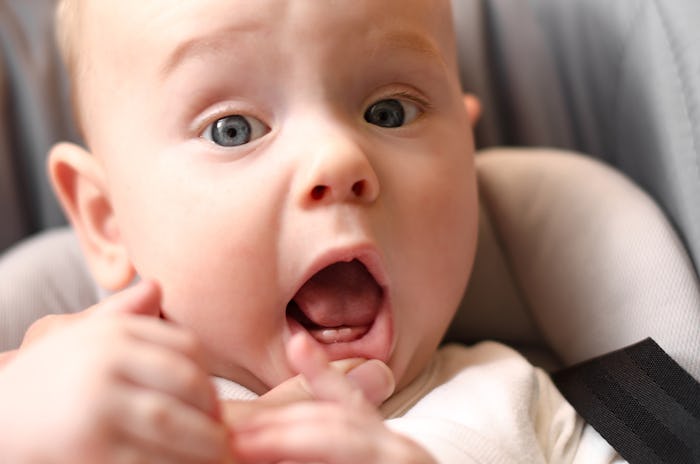Life
These Old Wives Tales About Early Teething Are Total Opposites
When you have a newborn in your life (and even long before), it seems that everyone has a piece of advice to bestow upon you. Whether your baby is fussy, has a full head of hair, or even gets his first tooth early, chances are there's a superstition tied to it — and you're definitely going to hear about it. But when it comes to old wives tales about early teething, the two most common myths are actually polar opposite, interestingly enough. You'll want to hear what they are... and then promptly ignore them because they're not true, of course.
Although some people believe there are certain old wives tales that hold a little clout, the ones about teething seem pretty far-fetched altogether. The National Center for Biotechnology Information (NCBI) shared that the two most common "folklore" in reference to early teething varies by culture and suggests that either it's a really good sign of fortune and high intelligence or a super bad omen. And honestly, I feel like that in itself is a pretty interesting assessment.
The NCBI further explained that in the Malaysian culture, the superstition is that early teething is a sign of good omen whereas it's a bad omen in Chinese culture, and that these babies are considered to be monsters and bearers of misfortune. Yikes.
Luckily, for you, none of that is based in any sort of science, study, or otherwise. Although a newborn with a tooth popping through (much earlier than expected) can seem pretty unfortunate for your breasts if you're nursing, that's really about the most misfortune you'll probably encounter.
As a rule of thumb, the age that teething normally starts can vary from child to child, according to Mama Natural. Some babies are closer to their first birthday before they get their first tooth, but the most common age for your little one's first tooth is around 6 months old. If your baby is teething within the first three months of their lives, or the newborn stage, it's safe to say that's considered pretty unique. And although unique is never bad, it doesn't mean that your child's necessarily blessed with good omen vibes either, like some old wives tales would have you believe.
Teething.org shared that what actually causes early teething often is as simple as genes. So, it's less about lifestyle and good or bad omens and more about whether mom or dad were teething early on or not.
So, ultimately, if you think that your baby teething early means they're for sure going to become President or that they're doomed to live the most undesirable life that ever existed, you can switch those thoughts right off. Sure having some good fortune might be desirable, the truth is that (good or bad) there's not any significance to the old wives tales tied to early teething.
And if you want to break down some of the pros and cons, I can maybe see how teething early may be fortunate or misfortunate. As far as I can tell, early teething means that mom gets through the teething and crying stage much quicker and doesn't have to deal with sore nipples for a second time down the line. On the other hand, it's kind of unfortunate to deal with the extra crying and pain sometimes associated with teething babies, especially if it's early enough in their life you're still trying to get in the groove of understanding their different cries or needs. Teething can definitely add in a whole new level of confusion and frustration. Ultimately, it's something all babies and moms go through at some point. Whether it's in the first week or after the first year, there's no superstition you need to worry about.
Check out Romper's new video series, Romper's Doula Diaries:
Watch full episodes of Romper's Doula Diaries on Facebook Watch.
